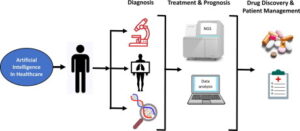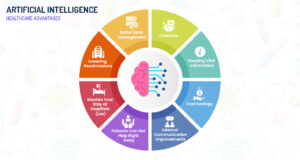AI in Early Disease Detection

The advent of Artificial Intelligence (AI) has heralded a new era in healthcare, especially in the realm of early disease detection. Traditionally, diagnosing diseases early often relied on the expertise of medical professionals and the limitations of conventional diagnostic tools. However, the integration of AI into this field is significantly enhancing the ability to detect diseases at their nascent stages, thereby improving treatment outcomes and patient prognoses. This article explores the various ways AI is revolutionizing early disease detection, focusing on its impact on accuracy, speed, accessibility, and the future of preventive healthcare.
Enhancing Diagnostic Accuracy
One of the primary benefits of AI in early disease detection is its potential to significantly enhance diagnostic accuracy. Traditional diagnostic methods often involve subjective assessments and the interpretation of complex data, which can lead to errors or inconsistencies. AI algorithms, particularly those based on machine learning and deep learning, can analyze vast amounts of data with remarkable precision. For example, AI systems trained on large datasets of medical images can detect subtle patterns and anomalies that might be missed by human eyes. In fields like radiology, AI is proving invaluable in identifying early signs of conditions such as cancer, cardiovascular diseases, and neurological disorders. These systems are capable of analyzing X-rays, MRIs, and CT scans with high accuracy, often outperforming human radiologists in terms of both speed and precision. By improving diagnostic accuracy, AI helps in identifying diseases at their earliest stages, which is crucial for effective treatment and better patient outcomes.
Accelerating Diagnostic Speed
The speed at which diseases are detected can have a profound impact on patient outcomes, particularly in conditions where early intervention is critical. AI technologies are transforming this aspect of disease detection by providing rapid analysis and diagnosis. Traditional diagnostic processes can be time-consuming, involving multiple steps and delays in result reporting. AI, however, can process and analyze data almost instantaneously. For instance, in oncology, AI algorithms can quickly evaluate mammograms to identify potential tumors, providing results much faster than traditional methods. This rapid analysis enables healthcare professionals to make timely decisions and initiate treatment sooner. In emergency situations, where time is of the essence, AI’s ability to provide swift and accurate diagnoses can be a game-changer, potentially saving lives and improving the overall efficiency of medical care.
Expanding Accessibility to Diagnostic Services
AI is also playing a crucial role in expanding access to diagnostic services, especially in underserved or remote areas. Access to advanced diagnostic tools and specialists can be limited in many regions, leading to delays in disease detection and treatment. AI-driven solutions, such as telemedicine platforms and diagnostic apps, are addressing these disparities by providing remote access to diagnostic capabilities. For example, AI-powered mobile applications can analyze medical images taken by patients themselves and provide preliminary assessments, which can then be reviewed by healthcare professionals. Additionally, AI-based chatbots and virtual assistants can offer initial consultations and guidance, helping to triage patients and direct them to appropriate care. By bridging gaps in access and providing remote diagnostic support, AI is helping to ensure that individuals in various geographical locations receive timely and accurate disease detection.
Supporting Preventive Healthcare
Early disease detection is a cornerstone of preventive healthcare, which aims to identify and address health issues before they become severe. AI is enhancing preventive measures by leveraging predictive analytics and risk assessment tools. By analyzing a wide range of data, including genetic information, lifestyle factors, and medical history, AI can identify individuals who are at higher risk of developing certain diseases. For example, AI algorithms can predict the likelihood of a person developing conditions such as diabetes or cardiovascular disease based on their health data and lifestyle choices. This predictive capability enables proactive interventions, such as lifestyle modifications or regular screenings, which can significantly reduce the risk of disease progression. AI’s role in preventive healthcare represents a shift from reactive to proactive management of health, aiming to mitigate potential health issues before they escalate.
Revolutionizing Disease Surveillance and Public Health
AI is also transforming disease surveillance and public health monitoring by providing real-time insights into disease patterns and outbreaks. AI systems can analyze data from various sources, including electronic health records, social media, and public health databases, to detect and track disease trends. This capability is particularly valuable in monitoring infectious diseases and managing public health responses. For instance, AI-driven analytics can help identify emerging outbreaks, predict the spread of diseases, and evaluate the effectiveness of intervention measures. During the COVID-19 pandemic, AI played a critical role in tracking the virus’s spread, predicting infection hotspots, and informing public health strategies. By enhancing disease surveillance and public health monitoring, AI contributes to a more informed and responsive healthcare system.
Addressing Challenges and Ethical Considerations
While the benefits of AI in early disease detection are substantial, there are also challenges and ethical considerations that must be addressed. Issues related to data privacy, algorithmic bias, and the need for transparency in AI decision-making are crucial aspects that need careful management. Ensuring that AI systems are trained on diverse and representative datasets is essential to minimize biases and ensure equitable healthcare outcomes. Additionally, safeguarding patient data and ensuring informed consent are critical to maintaining trust in AI-driven diagnostic tools. As AI continues to evolve, it is important to approach its implementation with a focus on ethical considerations and the need for human oversight in the diagnostic process.
The Future of AI in Early Disease Detection
Looking ahead, the future of AI in early disease detection holds great promise. Advances in AI technology, such as more sophisticated algorithms and improved data integration, are likely to further enhance diagnostic capabilities. The integration of AI with other emerging technologies, such as genomics and personalized medicine, will provide even more precise and individualized diagnostic solutions. As AI continues to develop, it will play an increasingly central role in shaping the future of healthcare, making early disease detection more accurate, accessible, and efficient.
Conclusion
AI is making significant strides in early disease detection, offering improvements in diagnostic accuracy, speed, accessibility, and preventive healthcare. By leveraging advanced algorithms and predictive analytics, AI is transforming the way diseases are identified and managed, leading to better patient outcomes and more efficient healthcare delivery. While challenges and ethical considerations remain, the potential of AI to revolutionize early disease detection is immense. As technology continues to advance, AI will likely become an even more integral part of healthcare, helping to detect diseases earlier and improve the overall quality of care.






